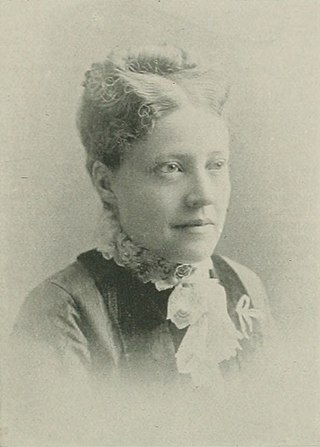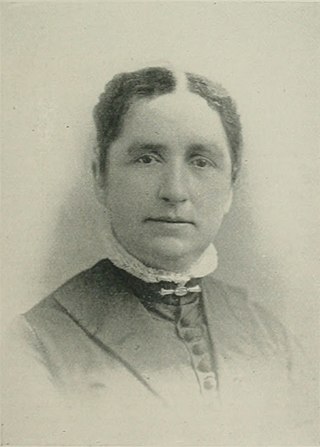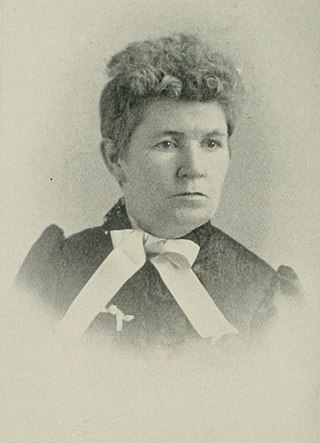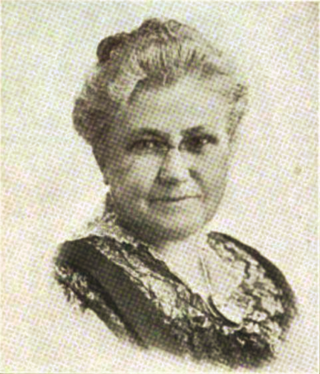
Martha McClellan Brown was an American lecturer, educator, reformer, newspaper editor, and major leader in the temperance movement in Ohio.

Judith Ellen Horton Foster was an American lecturer, temperance worker, suffragist, and lawyer. She is thought to be the first woman in Iowa who was actually engaged in practice and the fourth woman admitted to practice before the Supreme Court of Iowa. In her time she was known as "The Iowa Lawyer".

Zara A. Wilson was an American reformer and lawyer.

M. Ella Whipple was an American physician.

Isabelle Gabriel Green Bigelow was an American suffragist and prohibitionist.

Mary Lathrap, pen name: Lena; known as "The Daniel Webster of Prohibition", was a 19th-century American author, preacher, suffragist, and temperance reformer. For 20 years, she was identified with the progressive women of Michigan who had temperance, purity, and prohibition as their watchwords, and the white ribbon as their badge. A licensed preacher for the Methodist Episcopal Church (1871), she served as president of Michigan's Woman's Christian Temperance Union (1882), co-founded the state's suffrage organization (1870), and worked on the amendment campaign (1874). She died in 1895, aged 56.

Emma A. Cranmer was an American temperance reformer, woman suffragist, and author. A talented suffrage speaker and prohibition representative, she served as president of the South Dakota Woman's Christian Temperance Union (WCTU) and the South Dakota Equal Suffrage Association. Some of her epigrams were published by the press. Cranmer died in 1937.
Mary E. Haggart (1843–1904) was an American suffragist, who was active in the women's suffrage movement in Indiana beginning in the late 1860s. Haggart was highly regarded for her strength of character, persistence and activism for women's rights, her career as a lecturer, as well her publication of the Women's Tribune. Throughout her lifetime, she consistently worked with the woman's suffrage and temperance movements and will forever be highly regarded as an advocate for both.

Amanda M. Way was a pioneer in the temperance and women's equal rights movements, an American Civil War nurse, a minister in the Methodist Episcopal Church in the 1870s, and a Society of Friends (Quaker) minister by the mid-1880s. Way, a founding member of the Indiana Woman's Rights Association, called for the state's first women's rights convention in 1851 and served as vice president of the proceedings. Way remained active in the Association, including service as its president in 1855, and helped reactivate it in 1869, renamed as the Indiana Woman's Suffrage Association. Elizabeth Cady Stanton and Susan B. Anthony dubbed her the "mother of 'The Woman Suffrage Association' in Indiana" for her early leadership and efforts in initiating the first women's rights convention in the state.

Eva Munson Smith was an American composer, poet, and author. She was the author of Woman in Sacred Song (1885), a representative work of what women have done in hymnology. She was the author of a large number of temperance songs and other works, which became very popular. Her poems appeared in Poets of America and other standard works. Her best known productions were "Woodland Warblings", "American Rifle Team March", and "I Will Not Leave You Comfortless".

Margaret Ray Wickens was an American public affairs organizer, social reformer, and charitable organization leader who served as tenth National President of the Woman's Relief Corps (WRC). Eloquent, Wickins was called the "Golden-tongued orator of the Woman's Relief Corps". Her executive abilities during the years that she was actively engaged in WRC advanced the organization's patriotic work. As an orator, philanthropist and industrial worker, Wickens had no peer. She served as president of the Kansas State Assembly of Rebekahs, and was active in the temperance movement, filling the role of district president of her Woman's Christian Temperance Union (WCTU) for several years. She was a teacher, a member of the Daughters of the American Revolution (DAR), and a prominent Good Templar. In her later life, she held a number of state positions in Illinois.

Janette Hill Knox was an American temperance reformer, suffragist, teacher, author and editor.

Lucy Switzer was an American temperance and suffrage activist. She wrote many articles for Pacific Christian Advocate and the Christian Herald, and was a columnist in Cheney, Spokane County, Washington. She established the women's suffrage movement in eastern Washington Territory.

Mary Osburn Adkinson was an American social reformer active in the temperance movement. She took a leading part in the organization of the Woman's Foreign Missionary Society of the Methodist Episcopal Church in Madison, Wisconsin, serving four times as its elected president. In Louisiana, she held the position of superintendent of the Woman's Christian Temperance Union (WCTU) and matron in the New Orleans University.
Bertha Fowler was an American educator, as well as a Methodist Episcopal Church preacher and deaconess. In 1901, she established the Woman's Home Missionary Society of the Methodist Episcopal Church, which united with the Woman's Foreign Missionary Society of the Methodist Episcopal Church in 1908.

Lella A. Dillard was an American temperance leader. She served as president of the Georgia State Woman's Christian Temperance Union (W.C.T.U.), and afterwards as National Director of the W.C.T.U.'s Peace Department.

Orpha Jane "Jennie" Murray Kemp was an American temperance movement leader, writer, and newspaper circulator, nationally known for her work with the Woman's Christian Temperance Union (WCTU), and for her Food Administration campaigning during World War I. For 50 years, Kemp was an active WCTU worker. She campaigned vigorously through California and Oregon in the interests of prohibition. She served as president of the Oregon WCTU and later as secretary of the National WCTU. Kemp was editor and publisher of Our Messenger, 1889–1903; circulation manager of The Union Signal, and The Young Crusader, 1903–12; and National WCTU press superintendent since 1912.

Eugenia St. John Mann was an American ordained minister, evangelist, temperance lecturer, and suffragist. She served as national evangelist of the Woman's Christian Temperance Union (WCTU), President of the Illinois WCTU, and national lecturer of the International Organisation of Good Templars (IOGT). St. John became ordained a minister in the Kansas Conference of the Methodist Protestant Church, and in 1892, was elected to the General Conference, being the first woman who ever sat as delegate in the General Conference of that denomination in the U.S. Mann held pastorates in ten churches, retiring from active work in 1920. She was known as a gifted orator who also composed her own songs for her evangelistic work. Mann also served as President of the Kansas Equal Suffrage Association, 1885–95.

Rev. Stella B. Irvine was a pioneer in the American temperance and prohibition movements. She served as President of the Southern California Woman's Christian Temperance Union (WCTU), as well as National and World WCTU Director of the Sunday School Department. She wrote a great deal of literature on behalf of prohibition. Her writings and teachings were utilized for many years in Sunday schools and organizations for the education of young people throughout the U.S. She also organized the first Sunday school teachers' training class in the U.S. (1906). Irvine was a Prohibition Party candidate for the California State Assembly (1914) and the United States House of Representatives (1918).

Lillian M. Mitchner was an American social reformer associated with the temperance and suffrage movements. She served as President of the Kansas State Woman's Christian Temperance Union (WCTU) for 28 years, and Superintendent of the Kansas Industrial School for Girls.


















